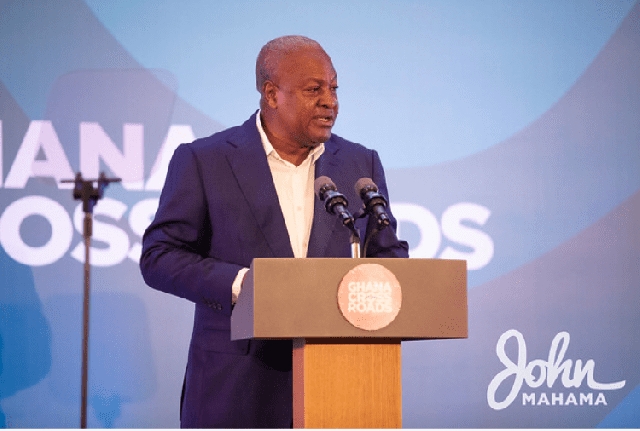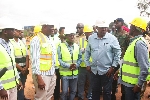Mahama paints gloomy image of Ghana at Chatham lecture | Says Ghana’s bankrupt
 John Dramani Mahama
John Dramani Mahama
Former President John Dramani Mahama has painted a dire image of Ghana to the intentional community in his lecture at Chatham House in the UK on the theme “Africa’s strategic priorities and global role”
Mr Mahama told the audience that Ghana will in a little under six weeks from today, 27 January 2023, mark 66 years of nationhood under the yoke of the worst economic situation in decades.
“We are currently bankrupt and burdened with a national debt we are simply not able to pay. You may have learnt over the past few weeks that the Ghanaian government has defaulted on the servicing of both external and domestic debt,” Mr Mahama said.
He told his audience that “there is currently, a huge uproar over a controversial debt restructuring programme under which the middle-class of Ghana could be wiped out if plans to have them forfeit proceeds of government bonds on which they rely for investment and sustenance, are followed through. In absolute terms, up to about six million people could be deprived of their life savings and investments.”
He noted that Ghana’s banking and financial sector could also be under threat of insolvency if no suitable adjustments are made to the debt restructuring plans.
“Our present economic situation, underscored by our bankrupt status, sharply contrasts with our fortunes a little over a decade ago. At the time, our economy posted some of the highest growth rates in the world with a robust and fast-growing non-oil sector.
Today, many of our economic indicators are pointing south. We have in the last month entered the hyperinflation era with an inflation rate of 54%. Our currency has in the past few months been counted among the worst performing in the world, plummeting by as much as 54% in value within the first 10 months of 2022. Widening budget deficits have characterized economic performance since 2018,” he lamented.
He further indicated that a severe cost of living crisis fueled by ever-rising prices of basic goods has imposed extreme hardship on Ghanaians as the government struggles to meet some of its most basic commitments in areas like education and health.
According to the former President, “it would be no hyperbole to assert that our present state bears an uncanny resemblance to the late seventies and eighties.”
“How was a country with such bright prospects, only a decade ago, brought to its knees so quickly when it should have made far more progress?” he quizzed.
In his view, the present trouble with the Ghanaian economy stems from gross mismanagement and in some instances sheer recklessness.
He said the Government failed to sustain the gains made after the last IMF programme, which brought stability to the management of the Ghanaian economy.
He further noted that corruption has also contributed significantly “to bring us to this distressing juncture.”
He disclosed that the Government has been quick to pass off the COVID pandemic as a reason for the poor economic record yet, available data shows that many of Ghana’s neighbours in West Africa and further afield, posted much better economic performances than Ghana did during and after the pandemic.
He explained that the purpose of recounting these failures, “driven by mismanagement and corruption,” is to demonstrate how Africa depletes scarce resources generated from both the continent and development partners.
He said instead of thinking innovatively to address the fundamental economic problem, many leaders worsen it.
Using management of the COVID-19 pandemic as a case study. He said the current Ghanaian government mismanaged the COVID-19 funds.
Mr Mahama called for Africa to build stronger institutions to address institutional and political decay.
He said in building stronger institutions, Civil Society Organisations (CSOs) in Africa must also be prioritised.
He accused the Akufo-Addo-led government of overt efforts to weaken CSOs to bend them to its will.
A case in point he cited was the ouster of the then Chairperson of Ghana’s Electoral Commission and two other senior officials by the President of Ghana over what he described as “clearly flimsy and contrived reasons.”
“They were then replaced with persons with noticeable leanings towards the incumbent party and whose actions have served to undermine public confidence in their independence and neutrality, two ingredients which are vital prerequisites for the sustenance of Ghana’s acclaimed democracy,” he lamented.
Touching on the judiciary, Mr Mahama noted that until the advent of the Akufo-Addo government, Ghana’s judiciary had commanded tremendous public respect and confidence for their firmly independent posture but “this is arguably no longer the case.”
“This is a worry to investors because one of the factors that boosts confidence of investors to place their money in a country, is the faith they have that in event of a business dispute, they can expect the justice system to be a fair and neutral arbiter. For Africa to succeed in achieving her strategic priorities, we must strengthen institutions including the judiciary and grant them their deserved independence and freedoms as prescribed by law,” he added.
Haven painted a gloomy image of the country, Mr Mahama encouraged his audience not to lose hope in Ghana and Africa because it is far more useful to look forward to the future with hope than to brood over the present with despair.
He said if his National Democratic Congress (NDC) wins power in 2024, they will commit themselves to immediate structural reforms based on a national dialogue and forge a broad national consensus that will lead to the diversification of the economy and its production base; and the attraction of investment into industry, farming, agribusiness, the digital sector, and tourism.
“We are determined to process our natural resources like cocoa, gold, bauxite, oil, copper while we build more robust capacity to respond to global energy shocks,” he added.
Trending News

Fire guts mobile money and phone shops at Kasoa Walantu, two injured
02:29
GFL Secretary-General calls for urgent resolution of TDC–TMA permit dispute
08:15
Foreign Affairs Minister presents six new buses to Ministry staff
08:16
Sir Sam Jonah cries to gov't over alleged seizure of investments in Nigeria
07:14
Why Ofori-Atta can't be extradicted by US: Supreme Court affirms validity of 1931 US–UK extradition treaty in Ghana
02:41
EC stands by December 30 Kpandai rerun date
07:36
E/R: Kwahu Traditional Council gives IGP three-week ultimatum to release Abene Chief’s Palace
02:22
Mahama orders $78m payment to Justmoh to resume Agona–Nkwanta road works
08:01
Youth unemployment now a National security concern – Opare Addo
08:43
Parliament approves concession agreement for Accra-Kumasi expressway
08:15



